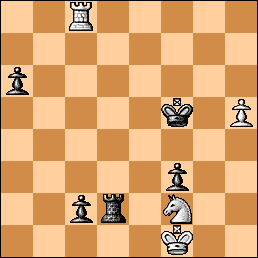Last night my opponent and I played a Caro-Kann in the Twin Cities Chess League (all game in 90). This game was a bit different than one I played a few weeks ago in which I was fighting to break out of my position for quite some time.
It started out with 1.e4 c6 2.d4 d5 3.e5 Bf5 4.Bd3 Bxd3 5.Qxd3 e6 6.Nf3 Qc7 7.O-O Nd7 8.Be3 O-O-O 9.c4. Hmmm, that was the first move to which I needed to spend time for the response. I did not like the idea of playing dxc4 and disrupting a pleasing pawn structure. I decided to leave this intact and played 9...g6.
This was an okay choice, as Steve did not plan to disrupt my pawns, either, with 10.c5. I quickly played 10...Bh6, offering him to trade Bishops for some mobility for my g8 Knight.
Instead, we aggressively pushed pawns with 11.b4 f5 12.a4 f4. He retreated his Bishop to d2, and I continued to press with 13...g5 and 14...g4. This came with a time deficit on my side, as Steve had 77 minutes while I had 64 after our fourteenth moves. My last move was preparatory for some middle game fireworks.
After his 16. b5, I decided the time was right to strike. 14...g4 drove his Knight back to e1, which then removed one piece of protection from the e5 square. I felt the pressure building up on my Queenside, and since I castled to that side, I counterattacked!
16...Nxe5! 17.dxe5 Qxe5. I gave up a Knight for two pawns, but this opened up many opportunity for tactics in the middle game.
He played 18. Nc2 to presumably open up the e1 square for a Rook, but I would have none of it. I promptly played 18...Qf5 resulting in 19.Qxf5 exf5. The wonderful part of my sacrifice on move 16 was to allow my d-pawn to advance and cause trouble for my opponent. I played 20...d4, causing him to play 21. Nd1. (Obviously not Ne2 which would have allowed 21...d3.)
This set up 21...Bg7 with d3 as the threat. He moved his threatened Knight to b4, and I responded 22...fxg3 23.fxg3 d3. We traded off Bishops and his two Knights were in synchrony with each other.
We danced around the d2 square with 26...d2 27.Rad1 Rhd8 28.Rf2. At this point, Steve was kicking my behind on time. He had 49 minutes, I was down to 20:37. I again took some time on my next turn with 28...a6. I wanted to determine the fate of those pawns. After 29.bxa6 bxa6, I caught a break with 30. Nb1. I took the a4 pawn.
The pawn was traded back with 31.Rdxd2 Rxd2 32.Rxd2 Re4. He made sure I did not win the c5 pawn with 34.Re2 Kd7 35.Re5.
I played 35...h5 with 4:48 on my clock. After his 36. Kf2, I very quickly played 36...h4 to get my Rook to the f4 square with check. He had 23 minutes on his clock while I was now just over 3!
The last of the recorded moves for either of us were 38.Kg1 Rf3 39.Ne2 Rh3 40.Ng3 f4 41.Nf5 Nxf5 42.Rxf5 f3 43.h5 Ke6 44.Rf4 Rh4 45.Nc3 Rxh5 46.Rxg4 Rxc5. I had 0:36 seconds on the clock and moved without losing much time, thanks to the time delay.
There were enough dangers on the board that it took all of our attention to get to this final position (White to move) with 0:08 left for me and 0:09 for Steve. This was an incredibly intense game that might have been one of my best since I started playing tournament chess.

Here is the .pgn file for this game.
[Event "Twin Cities Chess League"]
[Site "Roseville Skating Oval"]
[Date "2006.11.17"]
[Round "3"]
[White "Steve, Metro Chess"]
[Black "Joe Erjavec, Tal Tales"]
[Result "1/2-1/2"]
1.e4 c6 2.d4 d5 3.e5 Bf5 4.Bd3 Bxd3 5.Qxd3 e6 6.Nf3 Qc7 7.O-O Nd7 8.Be3 O-O-O 9.c4 g6 10.c5 Bh6 11.b4 f5 12.a4 f4 13.Bd2 g5 14.Nc3 g4 15.Ne1 Ne7 16.b5 Nxe5 17.dxe5 Qxe5 18.Nc2 Qf5 19.Qxf5 exf5 20.g3 d4 21.Nd1 Bg7 22.Nb4 fxg3 23.fxg3 d3 24.Bc3 Bxc3 25.Nxc3 Rd4 26.Nba2 d2 27.Rad1 Rhd8 28.Rf2 a6 29.bxa6 bxa6 30.Nb1 Rxa4 31.Rdxd2 Rxd2 32.Rxd2 Re4 33.Nbc3 Rc4 34.Re2 Kd7 35.Re5 h5 36.Kf2 h4 37.gxh4 Rf4+ 38.Kg1 Rf3 39.Ne2 Rh3 40.Ng3
f4 41.Nf5 Nxf5 42.Rxf5 f3 43.h5 Ke6 44.Rf4 Rh4 45.Nc3 Rxh5 46.Rxg4 Rxc5 1/2-1/2
Tags: Twin Cities Chess League, chess
No comments:
Post a Comment